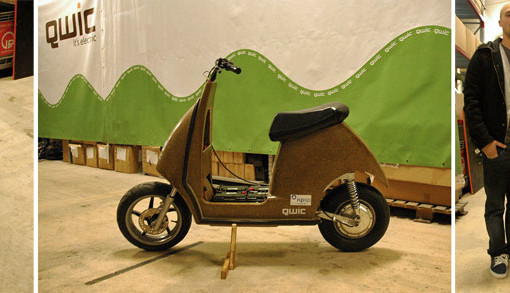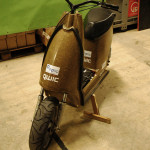Exclusive: A close look at the Qwic Tulp Hempscooter
on

Let it be no secret that we in Amsterdam like our greens. And so do the people at QWIC! Their Tulp electric scooter is green in every way imaginable: made out of hemp-composite, this electric scooter is totally bio-degradable, silent, clean and durable!
The Tulp

- Vaniek Colenbrander shows the Tulp
A week ago, on a very rainy day, me and Augustus visited QWIC’s headquarters, to take a closer look at their Tulp-scooter (Augustus wrote about earlier). Sadly it was too rainy outside to take the Tulp out for a spin. Vaniek Colenbrander welcomed us: the right guy to talk to as he basically designed the Tulp during an internship at QWIC, in 2008 when he was studying Industrial Design at Delft University. During this period he worked on the design and concept of the sustainable hemp-scooter. Later that year he pulled in a nice subsidy which kick started the actual development of the Tulp. The money was most welcome as the total costs of the prototype are at an estimate of €100.000. Approximately half of that is for lab tests, and the other half for actually producing the thing. Incredibly, the costs of the hemp-composite outer-shell is a mere €20!
At some point in the development of the Tulp, QWIC decided to start building the prototype instead of doing endless (expensive) lab tests on the material. This doesn't mean the scooter will fall apart just like that - the material is still tested extensively. The hemp-composite is about as strong as glass-fiber (but much cheaper, and eco-friendlier!). The choice to start building the prototype brings us to what we see here. A fully functional Tulp-prototype, with a reach of around 130 km., which is expected to rise by the time this model will be in production.
 By then, QWIC will offer you a decomposable, 80 kg weighing, electric hempscooter with a reach of 150 km, which fully charges in around 2 to 5 hours… And even though we love the 'rough green' composite finish, the production models will be freshened up with a clean paint job.
By then, QWIC will offer you a decomposable, 80 kg weighing, electric hempscooter with a reach of 150 km, which fully charges in around 2 to 5 hours… And even though we love the 'rough green' composite finish, the production models will be freshened up with a clean paint job.
But don't expect to pick up a Tulp right away. Next summer QWIC will continue to work on production and design of the Tulp, and start doing real life tests. The Tulp is not expected to hit the streets before 2011... So hold on a little while longer!
Clever QWIC
QWIC was started and is run by young people from different technical backgrounds. What sets them apart from the competition is the actual application of their technical knowledge. QWIC, industry leader of electric scooters in Holland, carefully select the parts they put in their scooters. It sounds ridiculous, but this is something the competition supposedly doesn't do at all. The big companies simply buy whatever parts 'work' and presumably are 'affordable' - mixing and matching different motors, chargers and batteries.
The people at QWIC don't play it like this. They hunt the market for the most suitable components to work together, to optimize the efficiency of their vehicles. They also work in close cooperation with the component-manufacturers, and extensively test the parts before using them. And this pays off! For example: they managed to design a bicycle with a reach of 150 km on one charge: a record. A simple and careful approach that really makes a difference.
Finally, the employees at QWIC are pretty positive and inspiring guys. One of their targets, as Vaniek explains, is to cut down the number of short cartrips. 90% of all car-traffic in Holland is for distances under 10 km, which is ridiculous. Ideally, in a few years we all pick up our decomposable QWIC hempscooters for these trips. And Vaniek certainly set the right example, as he drove home that rainy day on his electric scooter!


Discussion (2 comments)